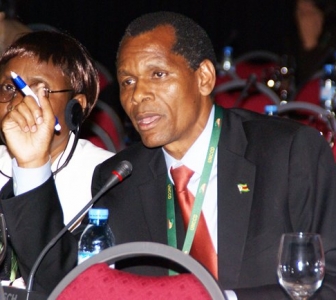
ZIMBABWE’S economy may take more time to recover despite overtures by government to relax indigenisation and empowerment regulations compelling foreign firms to sell controlling stakes to locals, an economic report has shown.
Bernard Mpofu,Acting Business Editor
According to the monthly state of the economy report compiled by Robertson Economic Information Services, pronouncements by new Youth Development, Indigenisation and Empowerment minister Francis Nhema to treat empowerment deals on a case-by-case basis may stimulate foreign direct investment inflows.
Nhema recently said government had decided that the indigenisation of foreign-owned banks should be done less rapidly than for other companies, adding that government would not adopt a blanket approach on the sector.
Mines minister Walter Chidhakwa last week said government was also ready to review empowerment deals for mining firms which promote beneficiation of minerals.
Government has since revised downwards economic forecasts due to uncertainty which gripped the market before and after the elections.
“Some encouraging signs have been forthcoming from promises of revisions to indigenisation regulations and to sections of the proposed new Income Tax Act, and from assurances that no plans will be made for the return of the Zimbabwe dollar before the economy fully recovers. Others have come from assurances of agricultural funding from African Export and Import Bank and African Development Bank, which are conditional upon acceptance of repayment terms,” reads the report in part.
“While these signs of pragmatism are helpful, they are not yet being translated into improvements in production, wages, buying power or investment levels. Unfortunately, actual policy changes and more time will be needed before they can begin to yield useful improvements in performance or sums of money that will become accessible. At present, tightening liquidity is placing corrective measures beyond the reach of most company directors.”
- Chamisa under fire over US$120K donation
- Mavhunga puts DeMbare into Chibuku quarterfinals
- Pension funds bet on Cabora Bassa oilfields
- Councils defy govt fire tender directive
Keep Reading
Severe constraints such as huge trade deficit, the report further stated, were still affecting the general availability of bank finance, thereby slowing economic recovery.
Official figures show that in the first eight months of 2013, the value of imports exceeded export revenue by $3 billion.
“Zimbabwe’s banking sector’s prospects of breaking out of its high interest rate and low-liquidity straightjacket are tied directly to its prospects of attracting injections of new equity, lines of credit or longer-term loans. These prospects are being severely compromised by indigenisation demands, which still require foreign-controlled companies to seek Indigenisation Compliance Certificates that commit them to relinquishing 51% of their shares,” the report stated.











